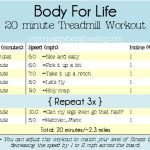Having sugar after a workout is not recommended as it can hinder your progress and negate the benefits of your exercise. Consuming sugar post-workout can lead to an increase in insulin levels, which can disrupt your body’s ability to burn fat and build muscle.
It is essential to focus on nutrient-dense foods that provide the necessary energy and aid in muscle recovery instead of relying on sugary snacks or drinks. Opt for options such as lean protein, complex carbohydrates, and healthy fats to support your post-workout recovery process.

Credit: www.nytimes.com
The Truth About Sugar And Its Impact On Post-Workout Recovery
How Does Sugar Affect Your Body After Exercise?
Sugar has a significant impact on your body after a workout session. Here are key points to understand about the role of sugar in post-workout recovery:
Consuming sugar replenishes glycogen stores: After an intense workout, your glycogen stores, which are the primary fuel source for muscles, become depleted. Sugar consumption helps replenish these glycogen stores, providing the energy your muscles need for recovery.
Enhances insulin response: Sugar triggers an insulin response, which is crucial for muscle repair and growth. Insulin helps transport essential nutrients, like amino acids, into muscle cells, stimulating protein synthesis and aiding in post-workout recovery.
Facilitates muscle protein synthesis: Sugar consumption can stimulate the process of muscle protein synthesis, leading to the repair and growth of muscle tissues. This is particularly beneficial when combined with a source of protein post-workout.
Restores electrolyte balance: During exercise, electrolytes like sodium and potassium are lost through sweat. Sugar-containing sports drinks can help restore electrolyte balance, improving hydration and promoting better recovery.
Understanding The Role Of Sugar In Muscle Recovery
Sugar plays a vital role in muscle recovery by providing the necessary energy and aiding in nutrient transport. Consider the following points:
Energy source for muscle cells: Sugar, in the form of glucose, is the primary source of energy for your muscles. It fuels muscle contractions, enabling you to perform better during workouts and aiding in post-workout recovery.
Promotes glycogen synthesis: Consuming sugar after exercise enhances the synthesis of glycogen, the stored form of glucose in muscles. This replenishment helps prepare your muscles for future workouts and prevents muscle breakdown.
Boosts insulin levels: Sugar consumption triggers the release of insulin, a hormone that plays a key role in muscle recovery. Insulin facilitates the uptake of glucose and amino acids into muscle cells, promoting repair and growth.
Supports muscle repair: Sugar consumption can promote an increase in muscle protein synthesis, facilitating the repair and regeneration of damaged muscle fibers. This is crucial for muscle recovery and growth.
Exploring The Benefits And Drawbacks Of Consuming Sugar After A Workout
While sugar can aid in post-workout recovery, it is important to consider the potential benefits and drawbacks. Here’s what you need to know:
Benefits of consuming sugar after a workout:
Rapid glycogen replenishment: Sugar provides a quick and efficient way to replenish glycogen stores, promoting faster recovery and better performance in subsequent workouts.
Enhanced nutrient delivery: The insulin response triggered by sugar consumption can aid in the delivery of essential nutrients to muscle cells, supporting muscle repair and growth.
Improved hydration: Sugar-containing sports drinks can help restore electrolyte balance, improving hydration levels during and after exercise.
Drawbacks of consuming sugar after a workout:
High-calorie intake: Sugar is calorie-dense, and consuming large amounts of sugary foods or drinks can lead to excessive calorie intake. This can hinder weight management goals and potential fat loss efforts.
Blood sugar spikes: Excessive sugar consumption can lead to rapid spikes in blood sugar levels, which may have negative effects on insulin sensitivity and overall health.
Nutritional quality: Relying solely on sugary foods or drinks for post-workout recovery can result in a lack of important nutrients. It is crucial to maintain a well-balanced diet to ensure overall health and optimal recovery.
Sugar can play a beneficial role in post-workout recovery by replenishing glycogen stores, promoting insulin response, and supporting muscle repair. However, it is important to consume sugar mindfully and in moderation, considering the potential drawbacks. Balancing sugar intake with a nutritious diet is essential for overall health and optimal recovery.
The Power Words You Need To Know
Uncovering The Science Behind Post-Workout Nutrition
After an intense workout, your body goes through various changes that require proper nourishment to aid in recovery and maximize results. Understanding the science behind post-workout nutrition is crucial for fueling your body effectively. Let’s delve into the key components of an effective post-workout meal, focusing on the role of carbohydrates in restoring glycogen levels and optimizing protein intake for muscle repair and growth.
The Key Components Of An Effective Post-Workout Meal
A well-rounded post-workout meal consists of three essential components: carbohydrates, protein, and hydration. By incorporating these components into your meal, you can aid in the recovery process and replenish energy stores. Below are the key points to consider:
Carbohydrates: Consuming carbohydrates after a workout is crucial as they help replenish glycogen stores in your muscles. This replenishment is vital for restoring energy levels, enhancing recovery, and preparing your body for the next session. High-quality carbohydrates with a moderate glycemic index, such as whole grains, fruits, and vegetables, are ideal choices.
Protein: Protein is the building block of muscle repair and growth. Including an adequate amount of protein in your post-workout meal helps promote muscle protein synthesis, speeding up the recovery process. Opt for lean protein sources like chicken breast, fish, tofu, or Greek yogurt to provide your body with essential amino acids.
The Role Of Carbohydrates In Restoring Glycogen Levels
Carbohydrates play a vital role in post-workout nutrition by replenishing glycogen levels in your muscles. Here are the key points to consider:
- Carbohydrates are broken down into glucose, which is stored as glycogen in your muscles and liver. During exercise, glycogen stores are depleted, especially during high-intensity workouts or endurance activities.
- Consuming carbohydrates after a workout triggers the release of insulin, facilitating the uptake of glucose into your muscles. This process helps replenish glycogen stores, promoting faster recovery and preventing muscle fatigue.
- Focus on consuming carbohydrates with a moderate glycemic index to ensure a steady release of glucose into your bloodstream. This allows for optimal glycogen restoration without causing glucose spikes or crashes.
Optimizing Protein Intake For Muscle Repair And Growth
Protein is crucial for repairing and building muscle tissue after a workout. Here’s what you need to know:
- Protein contains amino acids, which are the building blocks of muscle. By consuming protein after exercise, you provide your body with the necessary tools to repair damaged muscle fibers and stimulate new muscle protein synthesis.
- Aim for a protein intake of around 20-30 grams within the first 30 minutes to an hour after your workout. This timing is essential as your muscles are highly receptive to protein during this period.
- Opt for lean protein sources that are easily digestible and contain all the essential amino acids. This includes options like chicken, fish, eggs, or plant-based alternatives like tofu and legumes.
Remember, post-workout nutrition is just as important as the workout itself. By understanding the science behind it and making informed choices, you can maximize your performance, aid in recovery, and achieve your fitness goals more efficiently. Fuel your body with the right nutrients, and watch as your workouts become more effective and rewarding.
Finding The Right Balance
Are you wondering whether it’s okay to have sugar after a workout? It’s a common question among fitness enthusiasts and those looking to optimize their post-workout recovery. Finding the right balance is key when it comes to sugar consumption after exercise.
In this section, we’ll explore the importance of timing, balancing sugar intake with other nutrients, and choosing the right sources of sugar for optimal results.
The Importance Of Timing: When To Consume Sugar After A Workout
To maximize the benefits of sugar consumption after a workout, timing is crucial. Here are some key points to keep in mind:
- Consuming sugar within 30 minutes to an hour after your workout can help replenish glycogen stores, which provide energy to your muscles.
- During this post-workout period, your body is more sensitive to insulin, making it easier to transport sugar to the muscles for recovery.
- Aim for fast-absorbing sugars, such as glucose or dextrose, as they can be quickly utilized by the body for replenishment.
Balancing Sugar Intake With Other Nutrients For Enhanced Recovery
While sugar can play a role in post-workout recovery, it’s important to balance its intake with other nutrients. Consider the following points:
Protein: Pairing sugar with protein can enhance muscle repair and growth. Aim for a combination of carbohydrates and protein in a ratio of 3:1 or 4:1.
Fiber: Including fiber-rich foods can slow down the absorption of sugar, preventing a rapid spike in blood glucose levels.
Healthy fats: Adding a small amount of healthy fats, such as avocado or nuts, can help slow down the digestion of sugar and provide sustained energy.
Choosing The Right Sources Of Sugar For Optimal Results
Not all sugars are created equal, and choosing the right sources can make a difference in your post-workout recovery. Consider these points when selecting your sugar sources:
Natural sugars: Opt for natural sources of sugar, such as fruits or honey, which also provide essential vitamins, minerals, and antioxidants.
Avoid refined sugars: Highly processed sugars, such as those found in candies or sodas, can lead to a quick energy spike followed by a crash.
Sports drinks or gels: These products often contain a combination of sugars and electrolytes, making them convenient options for replenishing energy stores during intense workouts.
By finding the right balance of timing, nutrients, and sugar sources, you can make informed choices about including sugar in your post-workout routine. Remember, moderation is key, and it’s always best to consult with a healthcare professional or nutritionist for personalized guidance.
Debunking Common Myths And Misconceptions
After an intensive workout, it’s common to feel fatigued and in need of a quick energy boost. Many individuals turn to sugar as a post-workout snack, believing it will aid in their recovery process. However, there are several myths and misconceptions surrounding the consumption of sugar after exercise.
Let’s debunk these common myths and shed light on the truth.
Myth: Sugar Is Always Bad For Your Health
Contrary to popular belief, not all sugar is inherently bad for your health. While excessive consumption of refined sugars can lead to health issues such as obesity and diabetes, moderate amounts of naturally occurring sugars can provide an essential energy source for the body.
The key lies in choosing the right type of sugar and consuming it in moderation.
- Natural sugars found in fruits, vegetables, and dairy products come packaged with essential vitamins, minerals, and fiber, making them a healthier option.
- Added sugars, on the other hand, are often found in processed foods and beverages, providing empty calories and limited nutritional value. It’s crucial to limit your consumption of added sugars to maintain a well-balanced diet.
Myth: Only Simple Sugars Are Beneficial After A Workout
Another common misconception is that only simple sugars, like those found in candy or energy drinks, are beneficial after a workout. While simple sugars are quickly digested and can provide a rapid energy boost, they lack the necessary nutrients to support proper recovery.
- Complex carbohydrates, such as whole grains and starchy vegetables, are a better choice as they provide sustained energy and essential nutrients. These carbohydrates are broken down into simple sugars by the body and released gradually, ensuring a continuous supply of energy.
Myth: You Need Large Amounts Of Sugar To Maximize Recovery
It’s a widespread belief that consuming large amounts of sugar after a workout is necessary to optimize recovery. However, this is not entirely true. While sugar can replenish glycogen stores in muscles and aid in recovery, excessive sugar intake can lead to an imbalance in blood sugar levels and unwanted weight gain.
- Instead of relying solely on sugar, it’s vital to focus on a well-rounded post-workout meal or snack that includes a combination of protein, carbohydrates, and healthy fats.
- Incorporating foods like lean proteins, whole grains, fruits, and vegetables will provide your body with the necessary nutrients for muscle repair, glycogen replenishment, and overall recovery.
Debunking these myths clarifies the role of sugar in post-workout nutrition. It’s essential to make informed choices by prioritizing natural sugars, including complex carbohydrates in your diet, and avoiding excessive sugar consumption. By doing so, you can maximize your recovery and support your overall fitness goals.
Alternatives To Sugar After A Workout
Exploring Natural Sweeteners: Are They A Better Option?
After an intense workout, it’s important to replenish your body with the nutrients it needs to recover and rebuild muscle. While many people reach for sugary snacks or drinks post-workout, there are alternative options that can provide a healthier source of sweetness.
Exploring natural sweeteners can not only satisfy your craving for something sweet but also offer additional benefits such as essential nutrients and a lower impact on blood sugar levels. Let’s dive into some of these alternatives and see if they can offer a better option than sugar after a workout.
The Role Of Whole Foods In Post-Workout Recovery
Whole foods are a key component in any post-workout recovery plan. They provide a wide range of nutrients that support muscle repair and replenishment. Sticking to whole foods instead of processed sugary snacks ensures that you’re giving your body the best fuel it needs to recover effectively.
Some popular whole food options to consider include:
Greek yogurt: Packed with protein and probiotics, greek yogurt can help repair and build muscles while aiding digestion.
Nuts and seeds: These nutrient-dense foods offer healthy fats, protein, and fiber to support muscle recovery and provide a sustained source of energy.
Lean meats: Chicken, turkey, and fish are excellent sources of protein, which is essential for muscle growth and repair.
Quinoa: This versatile grain is a great source of complex carbohydrates, which can help replenish glycogen stores and provide energy for your next workout.
Leafy greens: Rich in vitamins and minerals, leafy greens like spinach and kale provide antioxidants that reduce inflammation and aid in recovery.
Incorporating Fruit For Natural Sugars And Essential Nutrients
Fruit is not only delicious but also a great source of natural sugars and essential nutrients that can benefit your post-workout recovery. Some fruits to consider incorporating into your post-workout routine include:
Bananas: High in potassium, bananas can help prevent muscle cramps and aid in rehydration due to their electrolyte content.
Berries: Packed with antioxidants, berries can help reduce inflammation and promote muscle recovery.
Oranges: Loaded with vitamin c, oranges can support collagen production for healthy joints and muscles.
Apples: With their natural fiber content, apples provide a slow release of energy, making them a perfect snack option post-workout.
Pineapple: Containing bromelain, an enzyme that aids in digestion, pineapple can help reduce inflammation and promote muscle recovery.
By exploring natural sweeteners, incorporating whole foods, and including fruit as a source of natural sugars and essential nutrients, you can find healthier alternatives to sugar after a workout. These options not only provide sweetness but also contribute to your overall post-workout recovery and long-term well-being.
So next time you finish a training session, reach for one of these nourishing choices and give your body the fuel it truly deserves.
FAQs
Can I Have Sugar After A Workout?
Having sugar after a workout is not recommended as it can spike your blood sugar levels and undo the benefits of your exercise.
What Happens If I Consume Sugar After A Workout?
Consuming sugar after a workout can lead to a rapid increase in blood sugar levels, which can hinder recovery and energy replenishment.
Is It Better To Have Protein Instead Of Sugar After A Workout?
Opting for protein after a workout is a better choice as it aids muscle repair and growth, unlike sugar.
How Does Sugar Affect My Post-Workout Recovery?
Sugar can delay the post-workout recovery process by increasing inflammation, causing muscle soreness, and depleting glycogen stores.
What Are Some Healthier Alternatives To Sugar Post-Workout?
Instead of sugar, choose natural sources of carbohydrates like fruits, whole grains, or sweet potatoes to replenish energy levels after a workout.
Final Thought
To summarize, while consuming sugar after a workout can provide a quick source of energy and aid in glycogen replenishment, it should be done in moderation and as part of a well-balanced post-workout meal. The type of sugar and the timing of consumption play a crucial role in determining its impact on your fitness goals.
Natural sugars found in fruits, for instance, can be a healthier option compared to processed sugars. Moreover, it is important to be mindful of the overall calorie intake and the impact on weight management. Incorporating some sugar into your post-workout routine can be beneficial, but it should be complemented by nutrient-dense foods that support muscle recovery and overall health.
Ultimately, consulting with a nutritionist or dietitian will help you personalize your diet based on your specific needs and fitness objectives. Stay mindful, and make informed choices to optimize your workouts and achieve your desired results.





